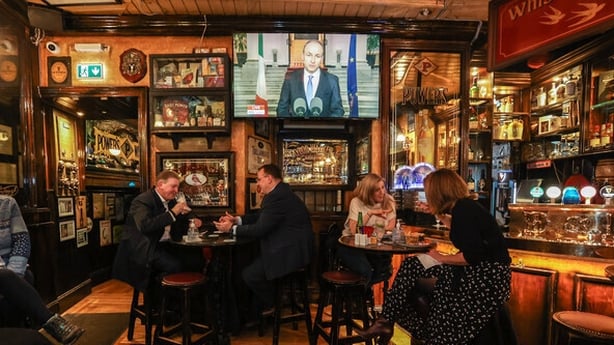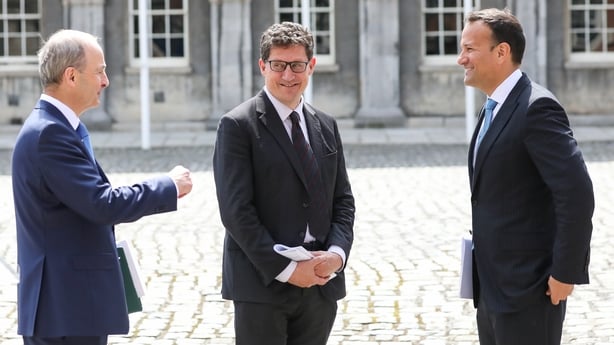He has looked assured in leading the Government response to the cost-of-living crisis and the war in Ukraine.
There has been an unflappability and deft diplomacy to his approach to the Northern Ireland Protocol and he is steadfastly committed to making the Shared Ireland initiative work.
Yet, the severe problems around housing have not been alleviated and the health service continues to face profound challenges too after his two-and-a-half years at the helm of Government.
Along the way several within his own party had privately predicted his downfall before today's changeover.
Instead, those who worked closely with him in Government describe an innately cautious politician who was exceedingly competent during a once in a century crisis.
"He is very committed, affable and decent," was the summation of one non Fianna Fáil minister.
The circumstances thrown up during his time as Taoiseach meant that Micheál Martin was always going to be a consequential figure, yet his popularity was far from guaranteed.
"I was not his greatest fan. But he did very well, and history will reflect that," was the view of someone who knows Micheál Martin since his first days as a minister.
He has at all times espoused centrist politics as evidenced from the tributes paid to him from the European Council Chairperson Charles Michel.
Dear @MichealMartinTD we will miss your soft-spoken ways and your constructiveness at the #EUCO table — always looking for a positive way forward and exploring compromise solutions. Thank you.
— Charles Michel (@CharlesMichel) December 15, 2022
We wish you all the best.
Go raibh maith agat agus gach rath ort! pic.twitter.com/vNPzD8qLgx
He commended Micheál Martin's "constructiveness" and desire to "always look for a positive way forward".
There is an irascible streak to him when his centrist views are challenged leading to frequently heated exchanges with Sinn Féin and People Before Profit.
The early part of his time as Taoiseach was defined as much by crisis as the historic composition of the coalition Government that brought the curtain down on the civil war political divide.
The sacking of Barry Cowen was seen as decisive and perhaps even rash by some in his own party.
"I think that was about self-preservation in the early days of the Government. If it was a year later, he might have given Barry more time to deal with things like he did with Robert Troy last summer," one senior Fianna Fáil politician said this week.
Those who know him well though point out that Micheál Martin does not voice political regrets publicly and he prefers to talk about things that went well.
One collective Government decision that did not proceed along those lines was the move to ease some of the public health restrictions in the weeks before Christmas 2020.
Talk from the Taoiseach and others about a "meaningful Christmas" was entirely misplaced.

Those who sat around the Cabinet at the time describe a sense of anguish as the Kent Covid variant looked to be close to overwhelming the health service.
"That was a mistake. We all know that now. But I think from that moment on, Micheál was going to be ultra-cautious, and he was proved to be right," one minister closely involved in almost all the major decisions said.
What followed was a prolonged lockdown and a successful vaccination programme.
However, the political pressure to accelerate the reopening of hospitality earlier in the summer of 2021 was intense, but Micheál Martin was adamant that the strategy would remain conservative.
"He has held the line well and maintained unity"
Throughout all this, major economic decisions to support businesses and households through the pandemic were taken.
"The approach was consistent and while no one wanted to speak about an inner Cabinet, these things were first thought out by the three party leaders along with the finance and public expenditure ministers," is how a source familiar with the process remembers the period.
That strategy was to come to the fore again just weeks after the final Covid restrictions were lifted and the war in Ukraine further fuelled the already rising cost of living.
"He (Micheál Martin) has held the line well and maintained unity when it comes to the response to Russia's war in Ukraine, but it's a tricky challenge," observed a minister.
That task now falls to Leo Varadkar and the question arises as to how quickly will Micheál Martin adapt to his new position as Tánaiste?
There are stories of Leo Varadkar in the early days of this coalition taking the wrong turn out of the Sycamore Room in Government Buildings, following the weekly meeting of the party leaders, and making his way instinctively to the Taoiseach's office.
Will the readjustment prove as confusing initially for Micheál Martin?
This will be first time too that Micheál Martin has had a political boss who is younger than him.
"I think this will be interesting to watch. Micheál put a lot of time into building the working relationship with Leo but now the dynamic will change somewhat," one senior figure said.

However, it is understood that when agreement cannot be reached among the Government party leaders, it usually arises from two of them siding with each other against the third one, rather than the Taoiseach taking a non-negotiable stance.
That working rule suggests continuity is likely to be preserved in the changeover.
There are some in Fianna Fáil who believe the state of that party is far more fragile though as Micheál Martin departs the office of Taoiseach.
He did oversee a radical reform of the party's aims and objectives, which gives Fianna Fáíl a more liberal outlook, and this got the backing of an Ard Fheis.
But there are still those who think Micheál Martin is not an "out-and-out party man" and they feel their views are often ignored in favour of those of a small coterie of advisers.
Were his personal satisfaction ratings to drop, which is possible when he moves to the more low-profile role of Tánaiste, then that dormant internal party angst could flare again.
It all means that his largely successful spell as Taoiseach will not safeguard him from future political party troubles.







